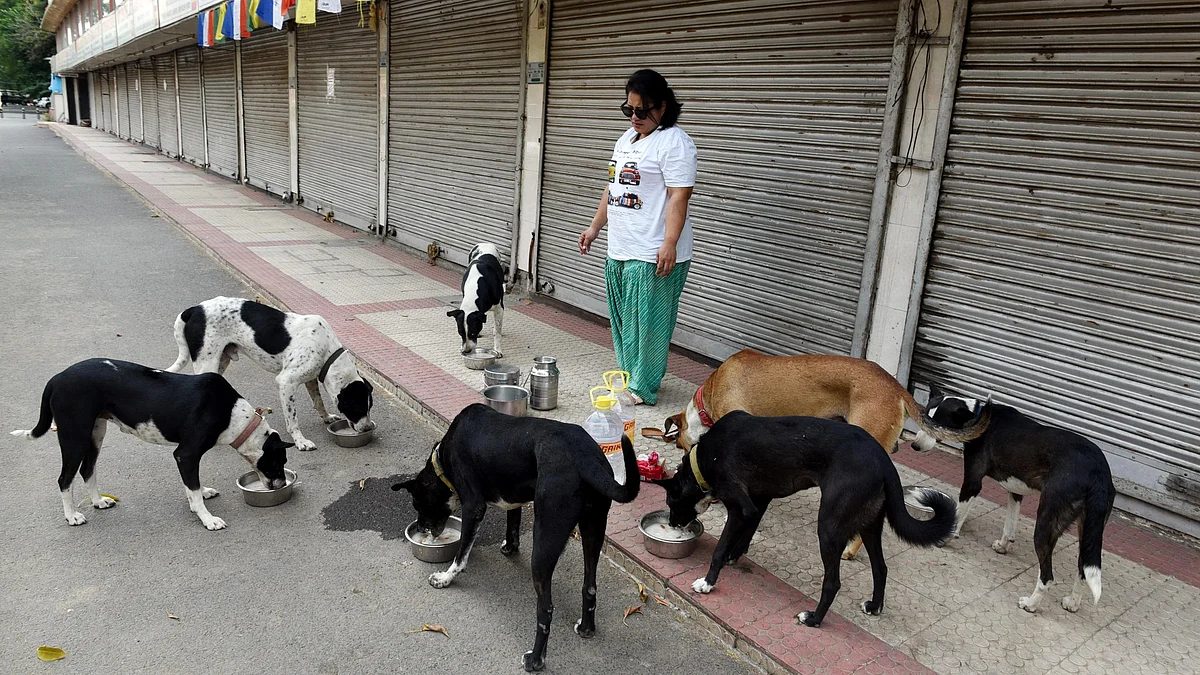Nation
Problem of stray dogs due to inaction of local authorities: Supreme Court
The three-judge bench reserved its order on the 11 August ruling, but no stay on shelters for now

Justice Vikram Nath pulls up local civic authorities for inaction
“We are not animal haters,” says Delhi government
“Mass relocation without planning is not the answer,” says defence
At least six previous orders have been ignored: senior counsel
Displacement and jailing of dogs has never worked: NGOs
The problem of stray dogs in Delhi-NCR is because of "inaction" by local authorities, the Supreme Court said on Thursday, 14 August, while reserving its order on the interim plea seeking a stay on the 11 August direction passed by a two-judge bench of the apex court.
A three-judge bench of justices Vikram Nath, Sandeep Mehta and N.V. Anjaria observed during the hearing on 14 August that “the whole problem is because of inaction of local authorities”. The bench also said everyone who has moved the apex court and filed interventions will have to own responsibility as well.
The judges did not, however, grant a stay on the directions issued to municipal authorities to commence building shelters and relocating the dogs there.
The Delhi government, through solicitor general Tushar Mehta, argued that children are dying due to dog bites causing rabies, and the issue of stray dogs needs to be resolved and not contested. There were over 37 lakh reported dog bites in a year, he claimed, and added, “Nobody is an animal hater.” (Delhi officially registered its last rabies case in 2022.)
Senior advocate Kapil Sibal, appearing for an NGO, said the situation was indeed “very serious” and the matter needs to be argued in depth. He sought a stay on some of the directions passed on 11 August, including the one asking the authorities to start picking up stray dogs from all localities in Delhi NCR “at the earliest” and relocating them to dog shelters.
“We’re not against public safety — but mass relocation without planning is not the answer,” he said.
Published: undefined
Senior advocate Dr Abhishek Manu Singhvi submitted that the suo motu order on 11 August ignored the earlier orders passed by the Supreme Court, which disapproved en masse picking up of dogs and held that the ABC rules have to be strictly enforced. Singhvi said that at least six previous orders have been ignored by the two-judge bench.
Published: undefined
Nationwide protests
The 11 August ruling set off a string of protests by animal welfare groups and NGOs in Delhi-NCR and across India with several leading animal rights organisations calling it a “death warrant”.
“This is chaotic, harmful and ultimately ineffective,” said Dr Mini Aravindan, senior director of veterinary affairs at PETA India. “Displacement and jailing of dogs has never worked. Dogs are territorial and removing them will only open the area to unsterilised dogs, worsening the problem,” she added.
Alokparna Sengupta, managing director at Humane World for Animals India, echoed these concerns. “Scientifically proven solutions such as scaling up Animal Birth Control (ABC) programmes must be the priority,” she stated.
Published: undefined
The ruling has also raised questions about legal consistency. According to Bharati Ramachandran, CEO of the Federation of Indian Animal Protection Organisations (FIAPO), the order contradicts the Animal Birth Control (ABC) Rules, 2023, which mandate that sterilised and vaccinated street dogs must be returned to their original location. “This move is not only illegal but also impractical and will dismantle stable, vaccinated dog populations,” she said of the Supreme Court order.
Published: undefined
Former union minister and animal welfare advocate Maneka Gandhi had called the 11 August judgement “strange and unworkable”. Reacting to the court’s action today, she said the decision needed to be reviewed “with love”, and added that the goals of both sides are the same.
She estimated that building shelters for thousands of dogs would cost upwards of Rs 15,000 crore. “This is financially impossible. There is no infrastructure, land or manpower for such a task,” she warned.
Experts argue that humane, science-backed interventions offer a better path forward. Suggested alternatives include mass sterilisation and vaccination, public education on rabies prevention, regulating the illegal pet trade, and community engagement.
(With agency inputs)
Published: undefined
Follow us on: Facebook, Twitter, Google News, Instagram
Join our official telegram channel (@nationalherald) and stay updated with the latest headlines
Published: undefined